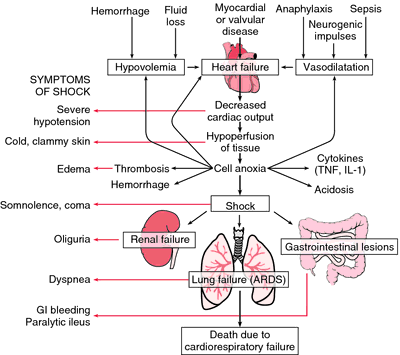paraphyletic:Image: Ivan Damjanov “Shock,” also known as circulatory shock, happens wh
paraphyletic: Image: Ivan Damjanov “Shock,” also known as circulatory shock, happens when a person’s blood is not carrying an adequate amount of oxygen to tissues. The body is programmed to go into emergency mode in such a way that ensures the maximum amount of available oxygen gets to the three most important places first — the heart, lungs, and brain. Blood pressure drops and heart rate increases, and this results in tissues farthest from the heart becoming ischemic. Hands or feet may change color. If untreated, shock can cause brain damage and/or death. Most cases of shock can be treated with IV fluids. The worst cases require IV and an oxygen mask (and pressors and blood products… thanks Dr. Corgiaddict). What, exactly, causes shock is not always clear, though, particularly when the cause appears to be related to sepsis or GI bleeding. Medical researchers have simply not known what it is, exactly, about bacterial infection or GI bleeding that causes shock. A new study in Science Translational Medicine suggests that shock is caused (or at least partially caused) by the leakage of bile enzymes into the bloodstream. These are enzymes produced by the pancreas to break down proteins and glycoproteins. Leakage can occur for lots of different reasons — bacterial infection causing destruction of the barriers between blood vessels and the intestinal space, or between blood vessels and the insides of pancreatic cells, or because of an aneurysm, etc. The study blocked the action of these bile enzymes in rats experiencing bile-blood leakage. The researchers showed that inactivating the proteases resulted in fewer instances of serious shock. -- source link
Tumblr Blog : paraphyletic.tumblr.com
#choque#circulatório#cardiaco#cardiac#trauma
